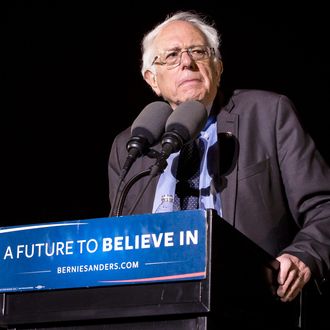
Bernie Sanders is a hopeless dreamer who doesn’t understand the limits of political possibility. Over the past year of campaigning, that critique has wandered from pundits’ columns to Hillary Clinton’s stump speech. The attack, while contentious, isn’t without merit: Sanders has outlined a sweeping agenda of social democratic reforms, which, in his own estimation, probably require a “political revolution” and a major Supreme Court decision to be realized. And yet, according to a new dispatch from the Sanders campaign, it may actually be the socialist senator’s political realism that costs him the Democratic nomination.
Throughout last fall, Sanders’s advisers encouraged him to go on the offensive against Clinton and spend more time campaigning in early states, the New York Times reports. But Sanders declined suggestions that he attack Clinton on her speaking fees from Goldman Sachs or her use of a private email server as secretary of State, describing the former — which has since become a staple of his stump speech — as “the sort of character assault he has long opposed,” reasoning, “She has the right to make money.” What’s more, Sanders insisted on devoting time to his job as senator, making his presidential campaign a weekend activity. Why was Sanders such a reluctant warrior? The Times explains:
All those decisions stemmed in part from Mr. Sanders’s outlook on the race. He was originally skeptical that he could beat Mrs. Clinton, and his mission in 2015 was to spread his political message about a rigged America rather than do whatever it took to win the nomination.
This was a pretty pragmatic view for a septuagenarian socialist to take in 2015. Ironically, it may be Sanders’s pragmatism that informs the most politically improbable aspects of his platform. There’s no reason for a protest candidate to consider whether his policies are politically tenable. The whole idea behind a “protest” candidacy is that these policies aren’t tenable, but that a vigorous campaign could shift the terms of debate so, one day, they could be. Had Sanders decided from day one that he was running to win, it’s conceivable that he may have moderated in certain areas (or at least done a bit more brushing up on foreign policy).
Had Sanders started campaigning full-time last April, spending early to boost his name recognition, particularly in African-American communities, one could imagine the senator earning decisive wins in Iowa and Nevada, completing a sweep of the first three primaries, and building enough momentum to at least narrow Clinton’s landslide margins throughout the South.
Still, Sanders’s natural strength among independents, and weakness among proud Democrats, would have dogged him through closed primaries either way. And more aggressive early attacks on Clinton could have sullied Sanders’s brand as an idealist, or inspired more aggressive counterattacks, that may have neutralized their political benefits.
Sanders appears to be the favorite in Wisconsin tomorrow, and polls in New York have been narrowing. He still has a theoretical shot at pulling off the unthinkable. But if defeating Clinton had been thinkable to the candidate himself in 2015, the “political revolution” might be a lot closer to victory than it is today.






























